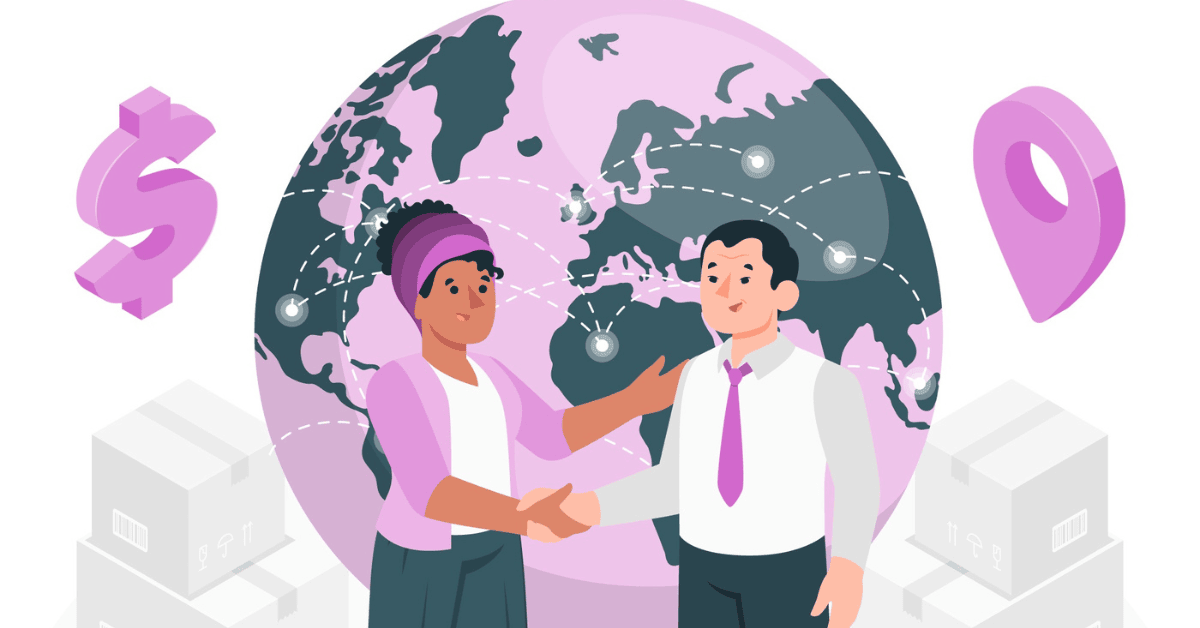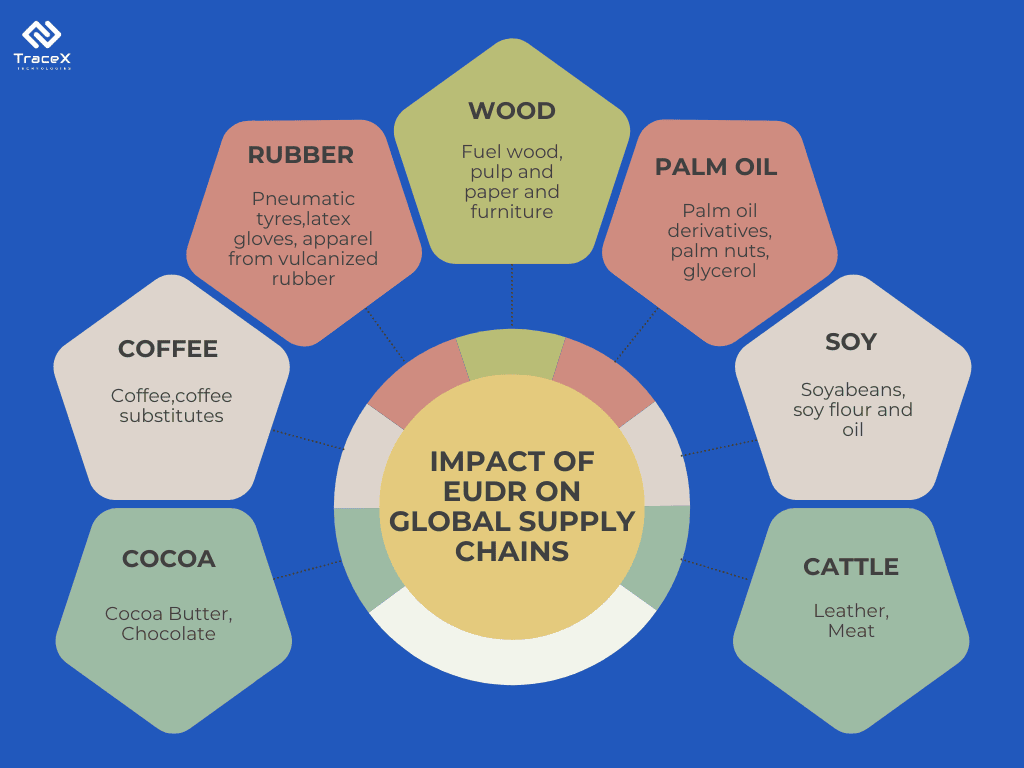Contact: +91 99725 24322 |
Menu
Menu
Quick summary: Explore the transformative impact of the EU Deforestation Regulation (EUDR) on global supply chains and discover how businesses can navigate compliance challenges to build a more sustainable future.

Do you know that the products we use every day—our food, cosmetics, even medical supplies—are directly linked to the destruction of some of the most vital forests on Earth. This alarming reality is what the EU Deforestation Regulation (EUDR) seeks to address. Designed to cut the ties between consumer goods and deforestation, the EUDR is more than just another regulation; it’s a pivotal shift towards a more sustainable and responsible global economy. The EUDR Impact on these global supply chains will reshape all the associated industries.
Whether you’re in the food and agriculture sector, the cosmetics industry, or even in medical manufacturing, the EUDR will likely impact your supply chain. Companies that fail to adapt to these new requirements risk not only legal repercussions but also significant damage to their reputation in a market that’s increasingly driven by conscious consumerism.
According to FSC, a growing number of consumers, over 80%, prioritize sustainability when purchasing wood and paper products. This shift in consumer behaviour underscores the importance of deforestation-free sourcing for businesses.
Deforestation in global supply chains poses a significant threat to the environment, contributing to biodiversity loss, climate change, and the degradation of vital ecosystems. The European Union Deforestation Regulation (EUDR) aims to combat this issue by imposing stringent due diligence requirements on companies importing commodities linked to deforestation, such as soy, beef, palm oil, cocoa, coffee, and rubber. Under the EUDR, businesses must ensure that their products are sourced from deforestation-free areas and comply with local laws regarding land use. As global demand for these commodities continues to rise, the EUDR represents a crucial step towards fostering responsible agricultural practices and safeguarding the planet’s forests for future generations.
At its core, the EUDR mandates that products entering the EU market must be deforestation-free, ensuring that their production hasn’t contributed to the loss of precious forests. This is crucial because global supply chains are vast and complex, often involving multiple layers of sourcing that can obscure the origins of raw materials. Without stringent regulations like the EUDR, it’s challenging to guarantee that the products we consume are truly sustainable.
This is the moment for businesses to rethink their supply chains and embrace transparency. The EUDR is not just a regulation to comply with—it’s an opportunity to lead the way in sustainable practices, positioning your brand as a pioneer in the global shift towards environmental responsibility.
The world is losing forests at an alarming rate. Between 2001 and 2020, an estimated 8.1 million hectares of forest vanished, driven primarily by land conversion for agriculture. This loss has severe consequences for biodiversity and climate stability.
The EU Deforestation Regulation (EUDR) is reshaping the landscape of the food industry, bringing sustainability to the forefront of sourcing and procurement practices. Traditionally, the complexity of global supply chains made it difficult to trace the origins of raw materials like soy, palm oil, and coffee—commodities often linked to deforestation. However, with the EUDR in place, the stakes are higher than ever. Food companies are now required to ensure that their products are sourced from deforestation-free areas. This shift is pushing businesses to reassess their supply chains, collaborate closely with suppliers, and invest in more transparent and traceable sourcing methods. The result? A more responsible approach to food production, but also a significant challenge for companies that need to align quickly with these stringent new standards.
For agricultural businesses, the EUDR is a game-changer. EUDR supply chain compliance isn’t just about ticking boxes; it’s about fundamentally transforming how these businesses operate. The EUDR requires agricultural companies to secure deforestation-free certifications for their products, a process that demands rigorous scrutiny of their entire supply chain. This means more than just knowing where your products come from—it means being able to prove, without a doubt, that they haven’t contributed to deforestation. Traceability systems, often powered by advanced technologies like blockchain, have become essential tools for achieving this level of transparency. These systems allow agricultural businesses to track their products from farm to fork, ensuring that every step of the process aligns with EUDR requirements.
Several companies in the food and agriculture sectors have already taken the lead in embracing EUDR compliance, setting a benchmark for others to follow. For instance, global food giants like Nestlé and Unilever have committed to sourcing deforestation-free commodities, implementing robust traceability systems to verify their supply chains. These companies are not just complying with regulations; they are proactively driving the industry towards more sustainable practices.
The EU Deforestation Regulation (EUDR) has far-reaching implications, even extending into the healthcare sector. One of the key areas of impact is the sourcing of raw materials like latex, which is essential for producing medical gloves, catheters, and other healthcare products. Traditionally, the origins of these materials were not closely scrutinized for environmental impact. However, with EUDR in place, medical companies now face the challenge of ensuring that their latex and other raw materials are sourced from deforestation-free areas. This new level of accountability is driving the need for more transparent and sustainable sourcing practices.
EUDR compliance in the healthcare sector requires a strategic approach. Medical companies need to reevaluate their supply chains, focusing on partnerships with suppliers who can provide traceable, deforestation-free materials. Implementing robust monitoring systems, such as blockchain-based traceability, can help ensure that every step of the supply chain meets EUDR standards. Additionally, engaging with third-party certifiers to verify the sustainability of raw materials can further strengthen compliance efforts. By taking these steps, medical companies can not only meet EUDR supply chain risks but also enhance their reputation as responsible and sustainable businesses.
Consumer brands are now under intense scrutiny as the EU Deforestation Regulation (EUDR) raises the bar for environmental responsibility. For these brands, compliance isn’t just about meeting legal requirements—it’s about protecting their reputation and earning consumer trust. Shoppers today are more informed and concerned about the origins of the products they buy, and any brand associated with deforestation risks losing credibility and market share.
Sustainable sourcing is at the heart of EUDR compliance for consumer brands. Companies must ensure that their raw materials, whether they are used in clothing, food, cosmetics, or other consumer goods, come from deforestation-free sources. This shift towards sustainable sourcing isn’t just a regulatory necessity—it’s a strategic move that aligns with the growing demand for eco-friendly products. Brands that can trace their supply chains and prove their commitment to sustainability are more likely to thrive in a market that increasingly values ethical and responsible production.
EUDR is also influencing broader market trends, driving a shift towards more eco-friendly products. As consumers become more aware of environmental issues, their purchasing decisions increasingly reflect their values. Brands that embrace EUDR and commit to sustainability are not just complying with regulations—they’re tapping into a powerful trend. This focus on eco-friendly products is reshaping the market, with more consumers seeking out brands that prioritize the planet. For consumer brands, aligning with these trends isn’t just good ethics—it’s good business.

The EU Deforestation Regulation (EUDR) significantly impacts the sourcing of key ingredients in the cosmetic industry, particularly palm oil, which is widely used in everything from skincare products to makeup. As a high-risk commodity linked to deforestation, palm oil now faces stricter scrutiny under EUDR. Cosmetic companies must ensure that their palm oil and other ingredients come from deforestation-free sources, which requires thorough vetting and supply chain transparency.
To navigate EUDR supply chain compliance, cosmetic companies can adopt several best practices. Conducting regular supplier audits and obtaining certifications for deforestation-free products are crucial steps. Building strong, transparent relationships with suppliers and implementing traceability systems can help ensure that all raw materials meet EUDR standards. By doing so, cosmetic brands not only comply with the regulations but also strengthen their commitment to sustainability.
Today’s consumers are more aware than ever of the environmental impact of the products they use, and there is growing demand for sustainable cosmetics. EUDR compliance offers cosmetic companies an opportunity to align with these consumer expectations. By sourcing ingredients responsibly and proving their commitment to deforestation-free practices, brands can enhance their appeal to eco-conscious consumers. In this way, EUDR compliance isn’t just about avoiding penalties—it’s about meeting and exceeding consumer demand for ethical and sustainable products and addressing EUDR supply chain risks.
The EU Deforestation Regulation (EUDR) is shaking up the fashion industry by placing stricter rules on sourcing materials like leather, rubber, and certain textiles that could be linked to deforestation. Fashion brands now need to ensure that their supply chains are deforestation-free, which means tracing where their materials come from and proving they weren’t produced at the expense of forests. This adds new layers of responsibility and transparency for fashion companies, pushing them to adopt more sustainable practices and be more accountable for their environmental impact.
The EU Deforestation Regulation (EUDR) is making a significant impact on the paper and packaging industry by requiring companies to prove that their wood, pulp, and paper products are not linked to deforestation. This means businesses must trace the origins of their raw materials and provide evidence that they come from sustainable, legal sources. The regulation is pushing the industry to adopt more responsible sourcing practices, prioritize certified and recycled materials, and improve supply chain transparency. Ultimately, it’s driving the paper and packaging industry towards greater sustainability, but it also adds new challenges in terms of compliance and documentation.
Smallholders, who play a vital role in global agricultural supply chains, face unique challenges under the EU Deforestation Regulation (EUDR). Limited access to resources, technology, and information makes it difficult for them to meet the stringent requirements of deforestation-free certification. Many smallholders lack the infrastructure needed for proper land management and traceability, putting them at a disadvantage when it comes to EUDR compliance.
To address these challenges, various initiatives and tools are being developed to support smallholders. Financial aid programs, targeted training, and accessible technology solutions are crucial in helping smallholders adapt to the new regulatory landscape. By providing education on sustainable farming practices and offering tools for better land management, these support mechanisms enable smallholders to achieve compliance without bearing an undue burden.
Including smallholders in EUDR compliance efforts is essential for the regulation’s overall success. Smallholders are often the backbone of the agricultural supply chain, and their participation ensures that deforestation-free practices are implemented at the grassroots level. By empowering smallholders and integrating them into the compliance process, the industry can create a more equitable and sustainable future, ensuring that the benefits of EUDR are felt by all.
TraceX is helping businesses navigate the complexities of EUDR compliance by offering blockchain-based traceability solutions that bring transparency to global supply chains. By enabling real-time tracking of materials from their origin to the final product, TraceX ensures that companies can verify and document that their products are deforestation-free. Additionally, TraceX integrates satellite monitoring solutions to assess and mitigate deforestation risks, providing an extra layer of assurance that raw materials are sourced responsibly. This technology not only simplifies compliance but also builds trust with consumers and stakeholders by proving that the products they use are sustainably sourced. With TraceX, businesses can confidently meet EUDR requirements while contributing to the protection of our planet’s forests.
Explore our EUDR Compliance Software
As the EU Deforestation Regulation (EUDR) continues to reshape global supply chains, it’s clear that the path to compliance requires collective effort, innovation, and strategic adaptation. From smallholders to large multinational corporations, every link in the supply chain must align with EUDR’s supply chain due diligence to ensure a deforestation-free future. While the challenges are significant, the opportunities for creating more sustainable, transparent, and ethical supply chains are even greater. By embracing EUDR’s guidelines, businesses not only protect the planet but also build trust with consumers and secure long-term success in a rapidly evolving market.
